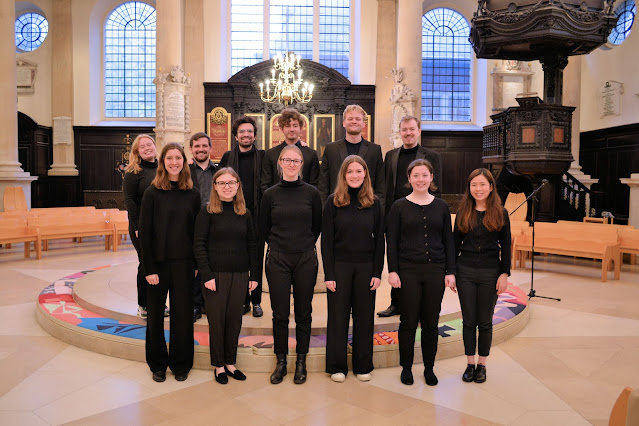It was a great pleasure to introduce Choral Classics at St Stephen Walbrook, live in church on Thursday 17th February 2022 and broadcast online on Monday 21st February 2022. My script follows. You can watch a recording below (the video will not appear in ‘mobile view’ – please click “view web version” at the bottom of the home page if reading on a tablet or phone) or watch on YouTube at this link.
MUSIC 1 : If ye love me – Tallis
Hello and welcome to Choral Classics, twenty minutes of sublime
music sung by our talented Choral Scholars under the direction of Olivia Tait
our conducting fellow and accompanied by Phoebe Chow our organ scholar. This
week, our music and readings explore the joys and complexities of ‘love’.
Something of the lifelong love of the sixteenth century composer
Thomas Tallis seems to be summed up in his brief but glorious motet ‘If ye love
me’ a setting of words from the Gospel of John. Serving a revolving door of
Catholic and Anglican monarchs whilst remaining true to his own belief for the
love of his art; Tallis kept Christ’s commandment to love one another. 457
years since it was composed, the piece continues to ‘bide with us’ as a much-loved
feature of the choral repertoire.
Our next
piece is Howard Goodall’s contemporary setting of Charles
Wesley’s hymn “Love divine, all loves excelling, joy of heav'n, to earth come
down”. Many note the similarity between the opening words of the text and a
song from Purcell’s opera King Arthur, in which Venus, the Goddess of Love
choses to come down to dwell here in the British Isles rather than her native
Cyprus. In Wesley’s hymn, he implores
Divine Love to leave heaven and dwell in the human heart.
The transcendent nature of divine love – and the complex up’s and down’s of our
lifelong search for and attempts to understand it – seem to be expressed in the
rhythm, layers and echoing of voices in Howard Goodall’s composition. At least
that’s what I think. What do you hear in the piece? Let’s listen.
MUSIC 2 : Love Divine – Howard Goodall
The Revelations of Divine Love record a
series of visions experienced a young woman who was close to death at the time
of the Great Plague. Her vivid imagery includes a vision of the whole universe
as a hazelnut, held in the palm of God’s hand. The young woman later became an
anchorite, living in a cell attached to St Julian’s Church in Norwich, by whose
name she is known. She spent the rest of her life reflecting on what her
visions might mean. In the final chapter of her text, she explains:
READING 1 : From the final Chapter
of Revelations of Divine Love, by Julian of Norwich
“From the time that it was revealed, I
desired many times to know in what was our Lord’s meaning. And fifteen years
after and more, I was answered in spiritual understanding, and it was said :
What, do you wish to know your Lord’s meaning in this thing? Know it well, love
was his meaning. Who reveals it to you? Love. What did he reveal to you? Love.
Why does he reveal it to you? For love.”
Julian’s revelations were an answer to her prayer to share more
deeply in the in the bodily experience of Christ’s passion – in which divine
love is so perfectly expressed. God so
loved the world that He gave His only begotten Son that who-so believeth in
Him, should not perish but have everlasting life. Words we now hear sung to
music composed by Bob Chilcott.
MUSIC 3 : God so loved
the world - Chilcott
We’ve grown to become familiar with
seeing signs of that resurrection life in the natural world; particularly in
the springtime. Imagery which bursts forth from every line of this extract from
The Song of Solomon, whose original melody is now lost to us but whose rhythm
and beauty lives on in this, most enigmatic book of the Bible.
READING 2 : Song of Songs 2.10-13
My beloved speaks and says to me:
‘Arise, my love, my fair one,
and come away;
for now the winter is past,
the rain is over and gone.
The flowers appear on the earth;
the time of singing has come,
and the voice of the turtle-dove
is heard in our land.
The fig tree puts forth its figs,
and the vines are in blossom;
they give forth fragrance.
Arise, my love, my fair one,
and come away.
Thank you for joining us today and a
special thank you, as ever, to our musicians for such beautiful music – and
thank you for your support – we rely on generous donations from people like
you, who love our ministry of music here at Wonderful Walbrook. There are ways
and means of making a contribution before you leave the church to help us
sustain it and we are most grateful for every donation.
Do stay with us for our Choral Eucharist which begins at 12.45pm, which is just
a click away if you’re watching online.
Before we say goodbye, one final piece
of music. A Golden Oldie composed by James “Pookie” Hudson in 1952 – a lament
on having to leave his girlfriend, Bonnie Jean each night after her mother
kicked him out onto the street. This choral version has been arranged by Kirby
Shaw and is offered as our belated but heartfelt Valentines message to each one
of you.
Goodnight, sweetheart!
MUSIC 4 : Goodnight, sweetheart – James
“Pookie” Hudson arr Kirby Shaw




No comments:
Post a Comment